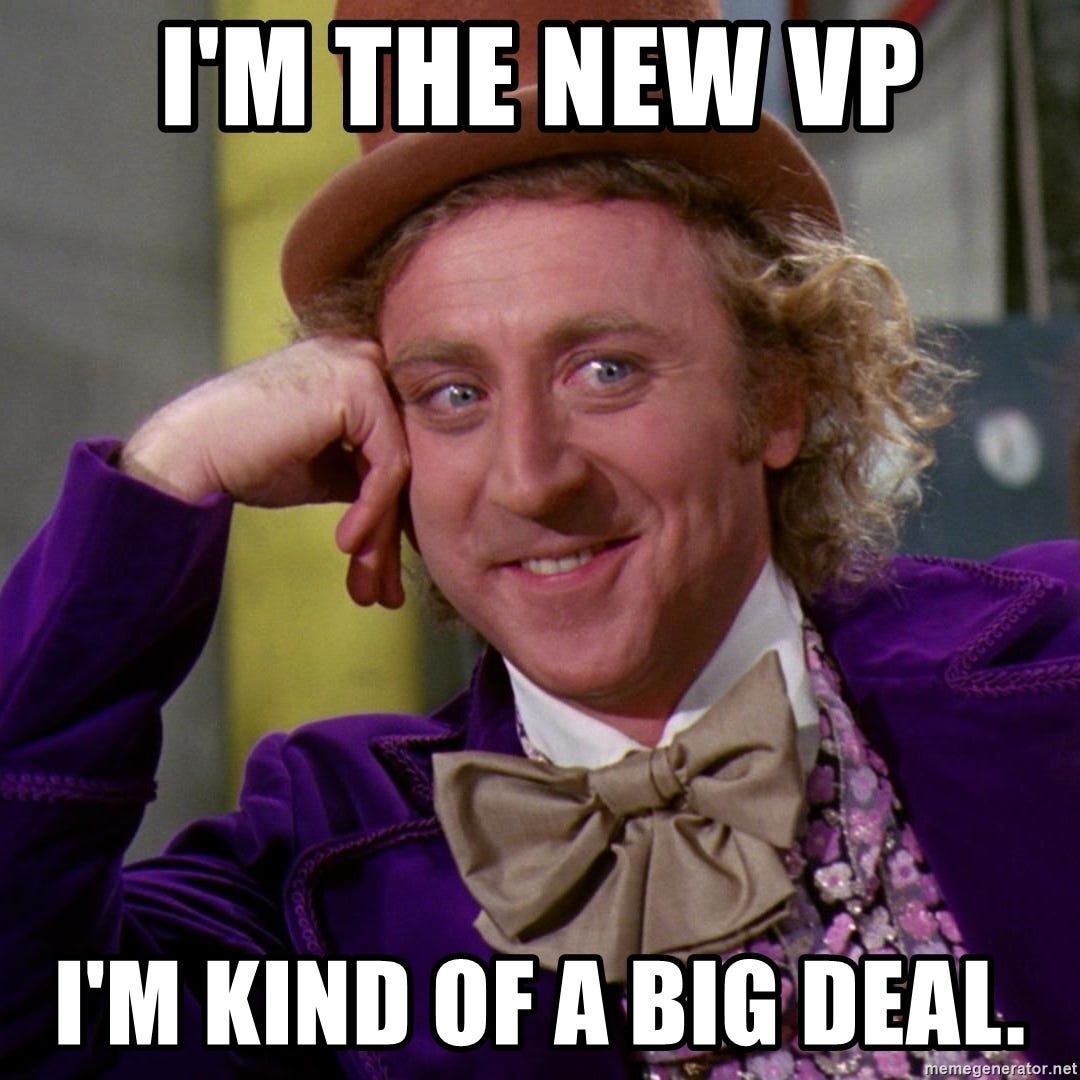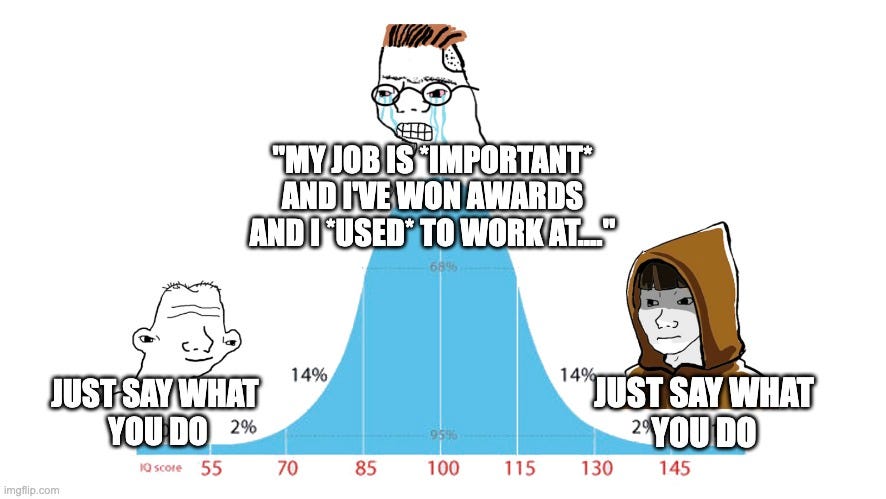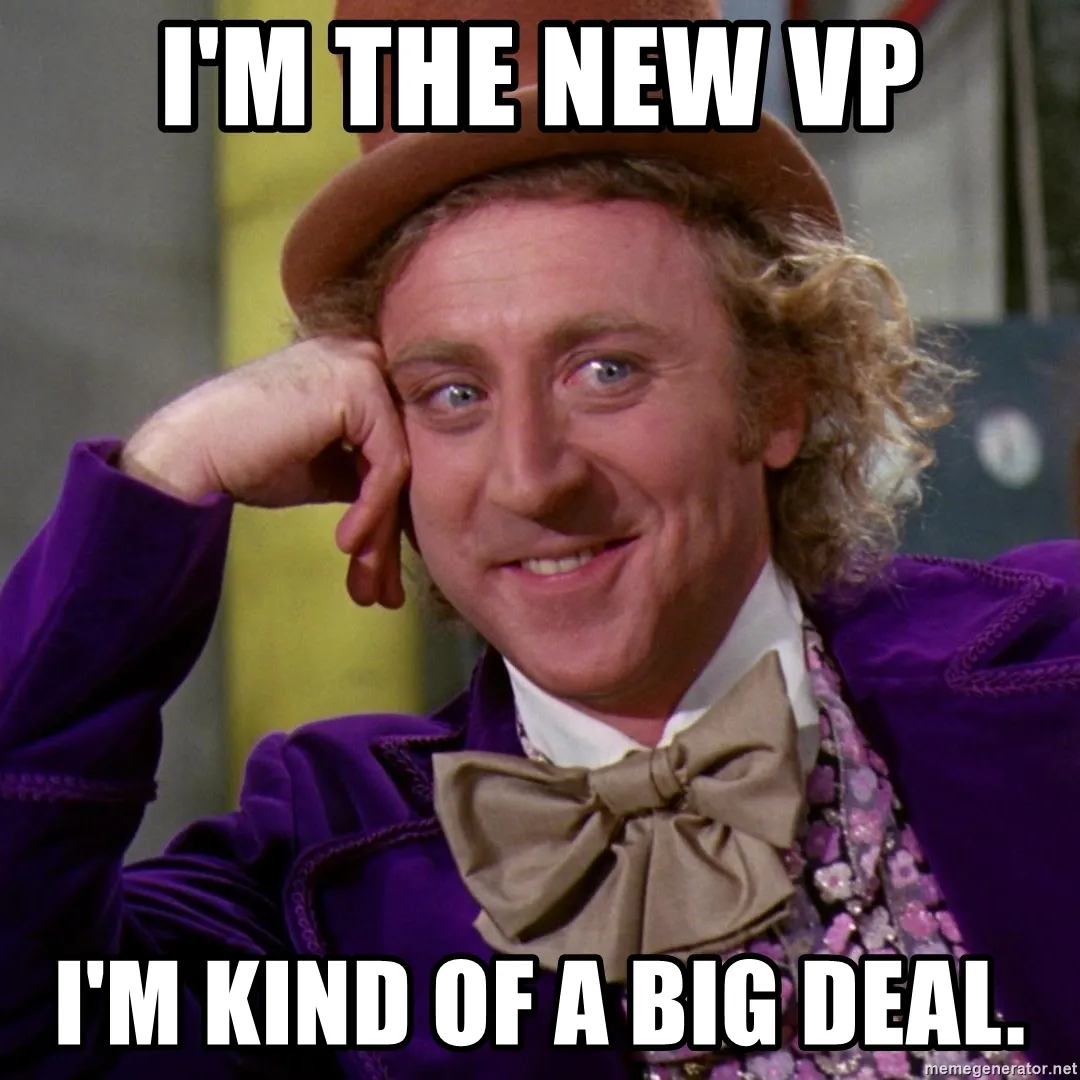“What do you do for work?”
Does hearing this question freak you out? Excite you? Or do you just kind of answer on autopilot?
If you’re inclined not to take the question too seriously, beware: Whether you like it or not, this seemingly simple inquiry will instantaneously categorize you within the social hierarchy. People use it to decide whether you are worthy of their time and respect. For instance, if you’re at a networking event in Silicon Valley, it will go something like this: ‘Oh, you’re a VP at Dropbox? How fascinating, let’s connect.’ ‘Oh, you’re a marketer at a pre-seed startup? I’d like to find someone more ‘important’ to talk to.’ Of course, nobody will say it to your face (although some VC might)… they will just find an excuse to switch into a different conversation. But everyone knows. Here, respect and attention are often contingent upon possessing a leadership-level title from a well-recognized company.
So, what’s the solution? Land bigger and better titles that win more and more respect? Unfortunately… that won’t work.
The Title Trap
We are social creatures and look for the validation of those around us—that’s totally natural. When you add in the fact that people often judge us by our titles, it’s understandable that we start to fixate on that one shiny set of words that comes after your name on your Linkedin, business card (do people still have these?), or email signature. We tie our identity to being an [X] role at [Y] company and begin a quest to level up “Once I land that this title at that company, then they’ll respect me!”

You may already see where this is going.
This pursuit of external recognition and validation begins to favor a linear and somewhat superficial progression through the ranks and fosters detrimental behaviors. Without even realizing it, this approach can lead you to feeling trapped. Here’s what I mean:
1. Trapped under superficial achievements.
For starters, the relentless chase for higher titles can lead individuals to prioritize superficial achievements over actual learning. One primary example of this: People choosing the quicker ascent to a coveted VP title through job hopping, rather than enduring the painful-yet-necessary experience of growing within a single organization. You can often jump up a rank (or even a couple) on the corporate ladder by switching companies, but the reality is that convincing a hiring manager isn’t the skill set that will make you good at your job. If you’re trapped in a bad situation and have learned everything you can from your current role, then by all means: Make the jump. But if it’s merely a matter of impatience to reach the next professional summit… you could be setting yourself up for disaster.
Unfortunately, I’ve seen too many people land the biggest roles of their lives by hopping jobs… only to realize they’re in way over their heads.
Unfortunately, I’ve seen too many people take this approach and land the biggest roles of their lives by hopping jobs… only to realize they’re in way over their heads. This can begin a cycle of overpromising and underdelivering that leaves a trail of business failures and destruction in its wake. And even if folks begin to realize it, they feel trapped—if they step back to gain the foundational experience they skipped over, it’s a huge ego hit. Very few can tolerate that, so they keep pressing forward.
2. Trapped in a Traditional Full-time Roles.
The fixation on titles and company logos can also trap individuals in traditional full-time roles that may not align with their skills or aspirations. When I first started exploring solopreneurship, my biggest fear was whether I would stay relevant… Because I truly believed that my *current* VP title was the only way to signal the value of my accomplishments to the market. I eventually disproved this theory for myself, as I feel even more relevant now as a solopreneur than when I had traditional full-time roles, but it took me well over a year (or two) and a lot of self-reflection to get there.
3. Trapped under External Expectations.
Perhaps most concerning is the inclination to make career decisions based on perceived market expectations rather than personal happiness and well-being. This mindset propels individuals down a path not of their choosing, driven by the desire to conform to societal benchmarks of success rather than pursuing what genuinely brings joy and satisfaction.
4. Trapped in a Never-ending Cycle.
This is the real kicker. If you think that getting a particular job with a particular company will give you everything you ever wanted… it won’t. Even someone with what you consider to be your dream role still probably wants their boss’ job. Or they want the same job at a bigger, more successful company. And if you go all the way to the top… well, would you say that Elon or Bezos or Zuck live perfect, worry-free lives? Me, either.
Don’t believe me? Send a message to someone with your dream job and ask: “Are you happy?” If they are, it probably isn’t because of their job title.
–
Okay, so, obsessing over job titles and external career progression doesn’t seem to be the solution… what is?
A Different Approach
How do we escape these traps? The answer is simple, but not easy: We have to distance ourselves from the idea that our worth is intrinsically tied to our professional titles. Such a shift in perspective encourages a more holistic view of success—one that values personal growth, happiness, and the pursuit of roles that truly resonate with our individual talents and passions.
Personally, this realization led me to leave Silicon Valley for quiet suburbs in Tennessee in hopes of distancing myself from an environment where my self-worth was increasingly defined by external perceptions. Making this transition may require some mental, emotional, and social shifts for you, too, even if a physical move isn’t in the cards.
But even then, this is still very difficult. Just because you’ve realized that you’re not defined by your job title… doesn’t mean that other people will get that. Aside from intro conversations with strangers, this question comes up all over the place.
Take a quick glance at LinkedIn profiles and you’ll see what I mean: Every time I see someone with credentials like “CMO, Ex-Google, Ex-Microsoft” as their profile headline… I feel conflicted. On the one hand, they get it: Whatever their current role is, it doesn’t have the same pedigree as their previous positions, so they’re trying to signal to others that they’re part of the in-group. On the other hand, it makes me feel sad: It’s disheartening to see individuals anchoring their self-esteem to their corporate affiliations, equating their professional worth with the jobs they’ve held in the past, regardless of the actual satisfaction or impact derived from those roles.

So, I think that’s the second part of this: After looking yourself in the mirror and acknowledging that you are not defined by your job title, you also need to figure out how to talk about what you do.
My recommendation: Share what you care about, what gets you excited about your work, what you feel uniquely capable of doing. Enthusiasm is difficult to fake and people tend to remember someone with visible passion in their eyes. Whatever level you’ve achieved, this approach will help you align your conversations with what you actually care about.
And if you can figure out how to communicate what’s important to you and someone still ignores you… that’s a pretty good indicator that they’re not worth your time, anyway.
